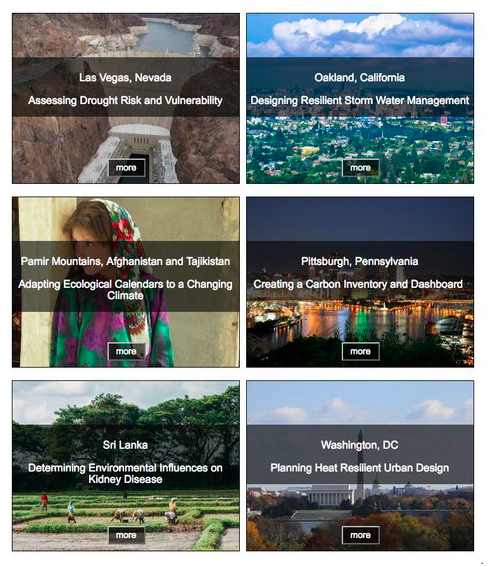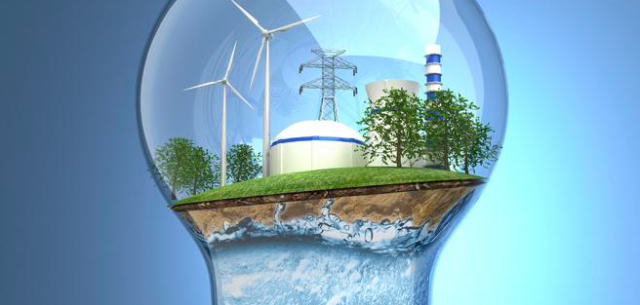NEWS Can Networked Knowledge Help Communities Thrive on a Turbulent Planet?
Article by Andy Revkin:
Article URL:
Science has long been focused mainly on knowledge frontiers, with universities often seeming to track “impact factors” of published papers more than a researcher’s impact in the real word.
But there’s been a welcome effort, of late, particularly in fields relevant to sustainable development, to shift priorities toward helping communities address challenges as humanity’s “great acceleration” plays out in the next few decades. An early iteration of this call came in a 1997 essay on “the virtues of mundane science” by Daniel Kammen of the University of California, Berkeley, and Michael R. Dove of Yale. (I discussed the essay in a lecture last year.)
It seems such efforts are gaining steam. For example, consider the growth of the Thriving Earth Exchange, an effort by the American Geophysical Union to help connect its global network of scientists with communities seeking science-based solutions to a variety of vexing problems:
Caption: Some examples of initiatives on which communities have sought advice from scientists through an online exchange.Credit Thriving Earth Exchange
When the initiative launched in 2013, the director Raj Pandya, wrote an article for Eos, the American Geophysical Union magazine, explaining the goal is “to enable communities to partner with Earth and space scientists and access the expertise needed to address problems arising from hazards, disasters, resource limitations, and climate change.”
The exchange has accumulated quite a list of projects at various stages of analysis and completion. I hope you’ll explore them here. I also urge you to listen to this short, succinct and compelling talk in which Pandya illustrates the merits of getting the right scientific expertise to the right problem by showing how targeted meteorological forecasting helped improve the deployment of limited supplies of meningitis vaccine in sub-Saharan Africa, saving lives and money.
An early iteration of such a network, now dormant, was Scientists Without Borders, created almost a decade ago by the New York Academy of Sciences (I wrote about it in 2008). This is an arena where trial and error are both vital.
In a related and creditable move, the White House and some partners today announced the launch of “Resilience Dialogues” — a way for communities at risk from climatic or coastal threats to connect with experts to reduce their vulnerability. In an email this evening, Amy Luers, the assistant director for climate resilience and information at the White House Office of Science and Technology Policy, explained that scientific expertise is actually a smart part of what’s needed:
This effort is focused on responding to communities’ request for guidance in their resilience planning by matching experts from a range of sectors (mostly not scientists) to meet the needs that communities have identified. These experts come from a range of technical assistance programs in both federal agencies and non-governmental groups. They are people who understand the regulations, manage grants programs, have developed and/or worked with tools that explore tradeoffs, and who have expertise in communication and public engagement. In fact, in the pilots, I would say that only about 10 percent of the subject matter experts were Ph.D. biophysical scientists.
I spent time a couple of years ago on the engagement committee of Future Earth, an international enterprise aiming to shift research investments in science toward goals that serve societal needs. As a result, I was a (minor) co-author on a paper in Global Environmental Change earlier this year aiming to illustrate “how science might contribute to the identification of desirable and plausible futures and pave the way for transformations towards them.”
It’s exciting to see this happening, including through another idea-sharing initiative that I recently highlighted: “Seeds of a Good Anthropocene.”
Please spread the word or give both the new White House initiativeand Thriving Earth Exchange a test drive if you have a resilience issue in search of solutions.
Further reading | Daniel Sarewitz, an analyst of the interface of science and society who teaches at Arizona State University, recently wrote an extraordinary and comprehensive essay warming of perils ahead for both science and society if institutions of science don’t shift priorities. The piece is in The New Atlantis, a journal on technology and society. Here’s his takeaway:
Advancing according to its own logic, much of science has lost sight of the better world it is supposed to help create. Shielded from accountability to anything outside of itself, the “free play of free intellects” begins to seem like little more than a cover for indifference and irresponsibility. The tragic irony here is that the stunted imagination of mainstream science is a consequence of the very autonomy that scientists insist is the key to their success. Only through direct engagement with the real world can science free itself to rediscover the path toward truth.


You must be logged in to post a comment.